Career Foreign Service officer Robert “Bob” Gilchrist (’86) assumed his latest post, United States Ambassador to Lithuania, in early February.
Gilchrist, who was previously director of the operations center at the State Department, has more than 30 years experience in the State Department and in U.S. embassies around the world. He has served as deputy chief of mission — a rank second only to ambassador — at U.S. embassies in Sweden and Estonia, and as director of Nordic and Baltic affairs in the State Department.
Earlier in his career, he served at U.S. embassies in Iraq, Romania, Venezuela and the United Kingdom and was a special assistant in the Office of the Deputy Secretary of State. He is a past president of GLIFAA (Gays and Lesbians in Foreign Affairs Agencies), an organization that promotes diversity in foreign affairs agencies and LGBT rights overseas.
Gilchrist, 56, is the latest alumnus to serve as a U.S. ambassador, joining:
Dennis Hearne (’82), ambassador to Mozambique;
William Roebuck (’78, MA ’82), former ambassador to Bahrain and current deputy Special Envoy to the Global Coalition to Defeat ISIS;
James Cain (’79, JD ’84), ambassador to Denmark, 2005-2009;
Jeanette Wallace Hyde (’58, LLD ’10), ambassador to Barbados and the Eastern Caribbean, 1994-1997;
David Funderburk (’66, MA ’67), ambassador to Romania, 1981-85; and the late
Graham Martin (’32, LLD ’69), ambassador to Thailand and Italy and the last ambassador to South Vietnam.
“I’m honored to be in that group, and I’m sure that Wake Forest will produce many more. We end up in all kinds of places,” Gilchrist said by phone in a half-hour interview from the U.S. Embassy in the capital city of Vilnius. Gilchrist is sharing his experiences in Lithuania on Instagram at @USAmbLT.
Read his testimony before the Senate Foreign Relations Committee.
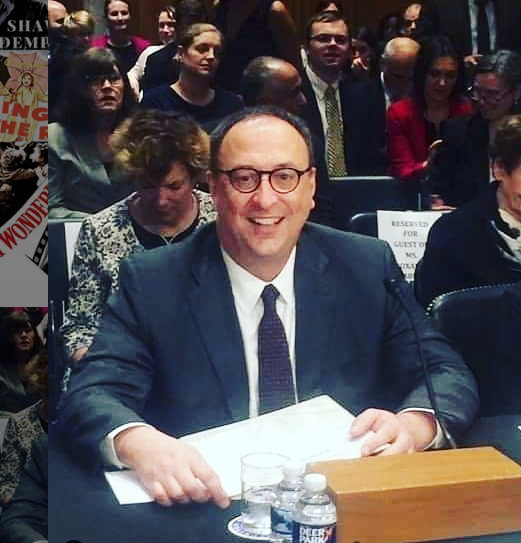
Robert "Bob" Gilchrist at his Senate confirmation hearing on Oct. 29, 2019.
First, can you talk a little about your background?
I’m from a small town in Central Florida called Leesburg. When I grew up it was full of orange groves, lakes, alligators, snakes and some retirees. Now it’s much more retirement heavy. I have two older brothers, and one of my brothers, Don Gilchrist (’76, MBA ’83), had a swimming scholarship at Wake Forest. As a kid, I went up and saw him a lot. He was a manager for Ryan’s Restaurant and later a partner in Village Tavern. My first job in high school was washing dishes at Ryan’s.
My father grew up outside of London in what, at least in how he conveyed it to me, was a very idyllic situation, like out of the movies, like in “Hope and Glory.” I grew up hearing stories of that, then subsequently of his experience in World War II in the Pacific. It gave me a vision of a life beyond my small town. My mother probably would have preferred it if I stayed in Leesburg. But once I joined the Foreign Service there was nobody who was prouder than my parents.
What was your career goal when you first came to Wake Forest?
I knew that I wanted to major in politics because it was what always interested me. Not politics from the running-for-public-office perspective, but looking at societies, trying to understand them. I knew vaguely about the Foreign Service, but I really discovered it when I was walking through Reynolda Hall one morning on the way to class, and I saw an advertisement (outside what was then the Office of Planning and Placement) for the Foreign Service exam. I ended up taking the exam at the U.S. Embassy in Paris during my senior year when I was in Dijon (France). After graduation I lived for a few years in Charlotte. Again, thanks to the placement office, I got a job in the executive training program for Ivey’s department store. I was there for a few years until I went to UVA to earn my master’s.
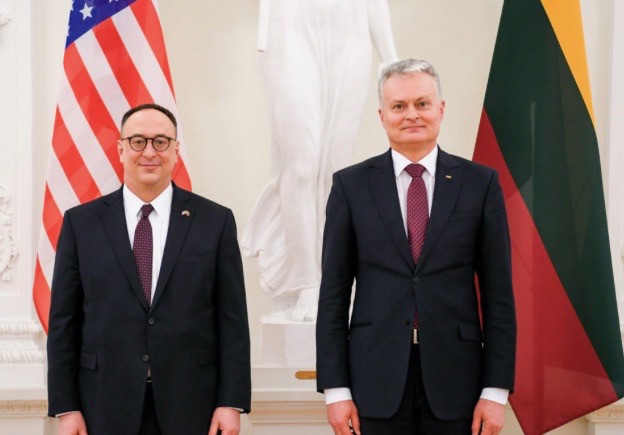
Ambassador Gilchrist presents his credentials to Lithuanian President Gitanas Nausėda in early February.
Who were some of your mentors?
I took an introduction to political theory class with Dr. (Robert) Utley (’71) that had a big impact and increased my understanding of values and basic human rights and fundamental aspects of how a society is organized, that are at the basis of politics and ultimately diplomacy. I had another class that only had four people in it. It felt like a Socratic class where he constantly asked us questions. There was another very good professor in a class on Marx and Tocqueville. And I still quote — not that I quote Marx all that much, so don’t worry — but I still draw on things that I learned in that class.
My semester in Dijon, with Byron Wells, was a really enriching experience. And I still speak French. I lived with a family as I think probably still happens with the program. There was a good group of students, and we all became very close because we hung around together and traveled around. It was the first time I’d lived for a prolonged period overseas. It was an incredibly valuable experience and one that I’ve carried with me for the rest of my life.
I know you were also involved in the University Theatre. How did that fit into studying politics and French?
I loved it. There were times I thought I would major in that (theatre) instead of politics. Someone who really impacted me was Mr. (James) Dodding. He was an institution at Wake Forest for a very, very long time. I was in three plays that he directed, and I was also in a play, “The Cherry Orchard,” that Dr. (Don) Wolfe directed. It was a great group of people, and I tremendously enjoyed it. When I was in London during my first tour, I brought Mr. Dodding into the Embassy for lunch, and around the same time, some of the folks from Worrell House as well. It was really rewarding to have Mr. Dodding there.
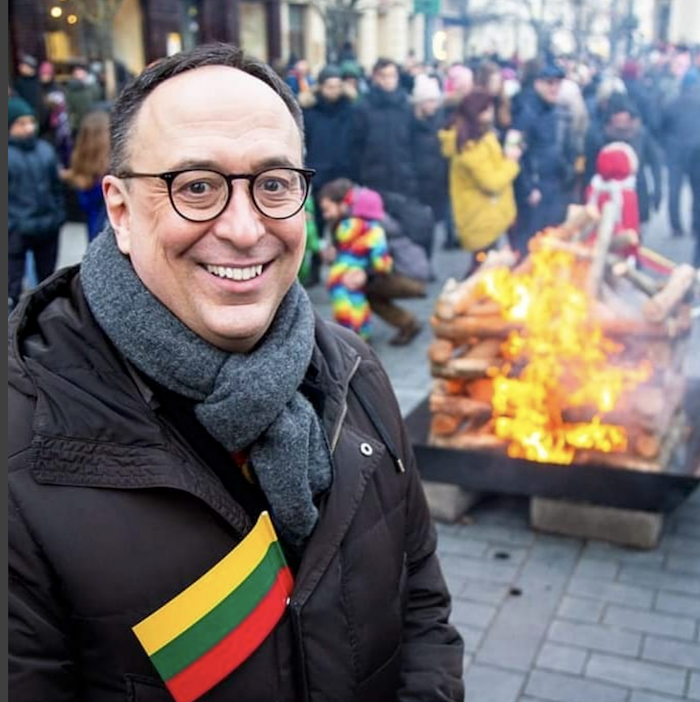
Ambassador Gilchrist lit one of the 30 symbolic bonfires to celebrate Lithuania's Independence Day on Feb. 16. <br />
Before you left for Lithuania, you attended a Call to Conversation dinner that was focused on LGBTQ issues, and you talked about a fellow student who was an inspiration.
Wake Forest was a very conservative environment then, and I saw an individual who stood out, at great personal risk. When I look back, I realize how courageous he actually was.
What’s the greatest thing that you took away from Wake Forest that still resonates today?
In a macro way, that very strong liberal arts background and the ability to write, the ability to communicate, the ability to think. I remember some of my professors and others (saying) that it wasn’t simply about learning skills, but also how to become a good citizen and how to lead a good life. I think I’ve carried that with me, not just through my career, but in my life.
You’ve been very generous with your time to meet with students in the Wake Washington program. What advice do you have for students interested in a Foreign Service career?
Take the Foreign Service exam, and if you don’t pass, take it again because it’s free. These days it’s much easier to find out what a career in the Foreign Service actually means. I came in before the internet. When I joined, I really didn’t know what to expect. Now there’s more information and communities online about life in the Foreign Service. It’s much easier to understand. The best preparation for the Foreign Service exam is a strong liberal arts education and reading good newspapers that matter and magazines and journals and staying apprised of what’s going on in the world.
What has inspired you to a life of service?
Once in a while I’ve been able to make a difference. And that every-once-in-a-while provides the fuel that’s helped me get through times when it seemed to be less stimulating for various sorts of reasons. This career can be challenging. People are ripped up from their friends and families. Just when you get settled into a place, you move on to something different. We operate in a lot of challenging environments. I was in Baghdad for a year during one of the worst times of the conflict. There are many sacrifices that Foreign Service officers make, but every once in a while, we can make a difference. And that’s what’s kept me going.
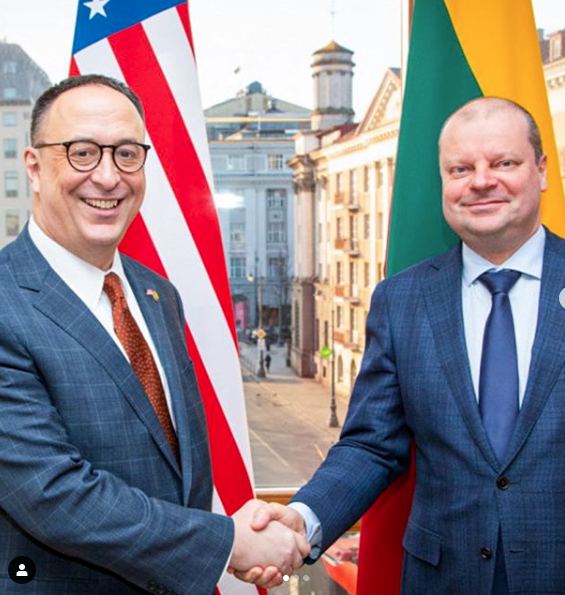
Ambassador Gilchrist meets with Lithuanian Prime Minister Saulius Skvernelis.<br />
Can you talk about your career path and how you advanced up the Foreign Service ranks?
Quite honestly, I learn something new every day. What I say to other Foreign Service officers is to be a good colleague and somebody that others want to work with, and then opportunities will show up you never quite thought were going to show up. You’ll have people rooting for you. I’ve tried to be someone who works well as a team member and who does the best I can by those who have served with me or whom I now lead.
In my second tour in Caracas, Venezuela, I worked for then-Ambassador Jeffrey Davidow, who later became Assistant Secretary for Latin America and then ambassador to Mexico. He was a mentor early on and helped me get some good positions and encouraged me. I’ve had other mentors along the way as well. I worked for two years as a special assistant to the Deputy Secretary of State, the No. 2 at the State Department, first for Strobe Talbott, who then went on to head the Brookings Institution, and then for Richard Armitage, who was a policy heavyweight. I had the opportunity to see how foreign policy was made at the senior level but also to observe a very effective leader who cared about the truth.
Michael Guest was the first openly gay Foreign Service ambassador, in Romania. I had the opportunity to work for him on a very interesting set of issues as Romania was joining NATO and then the EU. It was a country in transition with interesting human rights issues. I felt I could make a difference, and I was also working for an ambassador whose leadership I admired tremendously.
It’s sort of like the monkey bars. You’re in one place and then you move your hand and it takes you someplace else. I was in Baghdad (as deputy political counselor) at a time when Foreign Service officers were being called on to serve there. It was a different environment than I think any of us, certainly during my generation, had experienced, because we really hadn’t served previously in live combat zones to that degree. It was an intense year but, again, I learned a lot.
From there I became director for Nordic and Baltic affairs (at the State Department), where I developed tremendous knowledge of the Baltic and Nordic countries. Now I hope that I’m in the position of being able to mentor and pull along the team that’s working for me here.
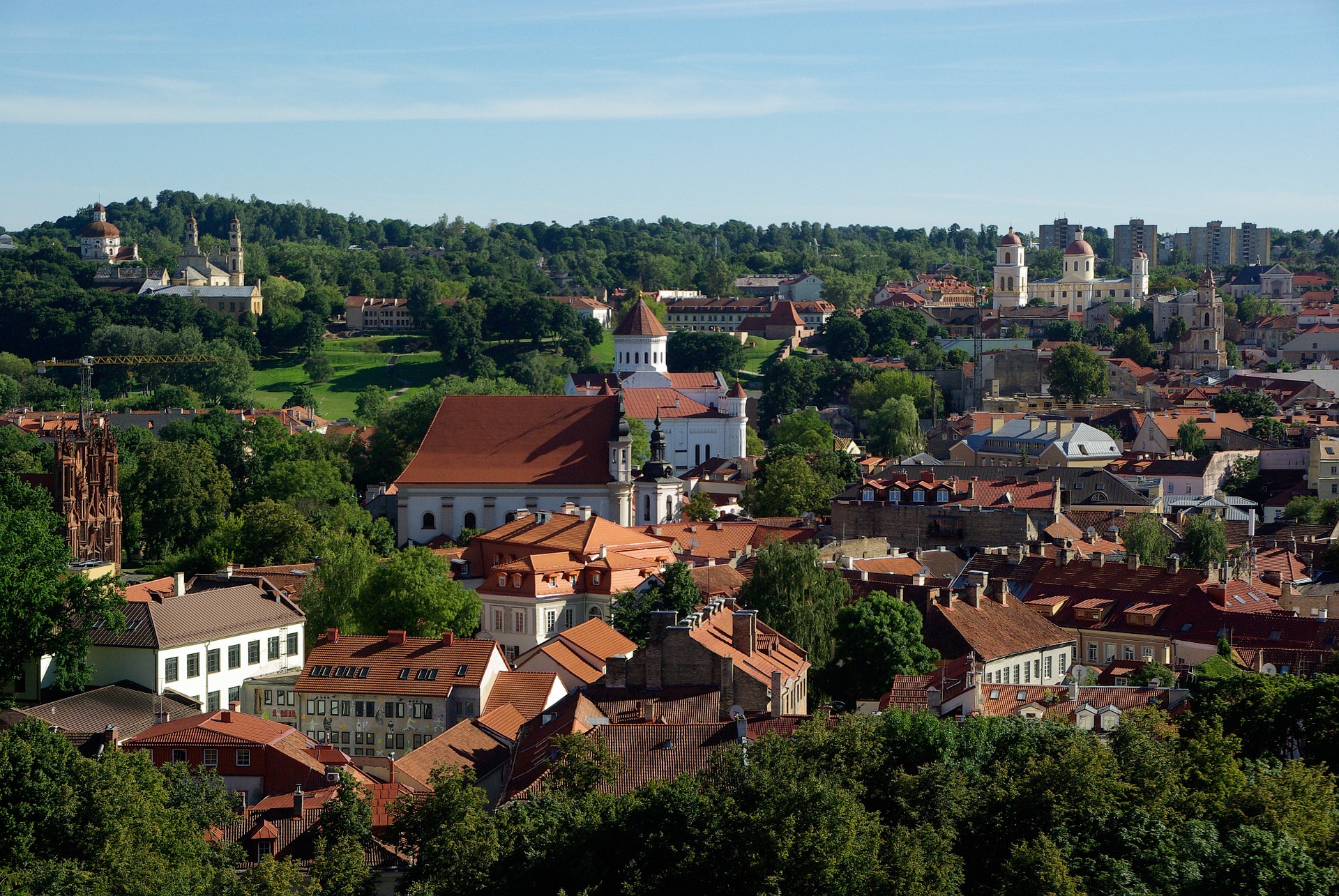
What has your first week in Vilnius been like?
I have a great team here. Lithuania loves the United States for so many reasons. Our defense relationship is really important. They are NATO partners that shoulder their weight, giving 2% of their economy to defense, which a lot of our European allies aren’t doing. There are many in Lithuania who remember what life was like under the Soviet Union and who longed to be part of the West and who have a strong vision of what the United States represents. This is an incredibly welcoming environment for Americans. In many ways I’ve felt that I’m among friends.
It’s a beautiful country. The old city is full of beautiful churches. There are so many that it’s actually led Vilnius to be called the Rome of the Baltic. I encourage folks when they’re coming through Europe to come here as well. This is a strong democracy that very much appreciates the United States as an ally and as a beacon of democracy.
Obviously, this is a time of great political division in this country. How do you keep politics out of what you’re trying to do?
U.S. interests are shockingly consistent, and many of the issues that I discussed during my (Senate) hearing, many of them are the same issues with Republican administrations and Democratic administrations … (such as) the strength of our security relationships. And both sides of the political spectrum see the importance of trade and investments. I’ve worked to help American companies under Republican administrations and under Democratic administrations. And explaining American institutions and our democracy has remained consistent as well.


